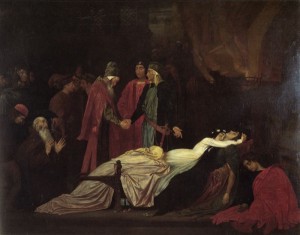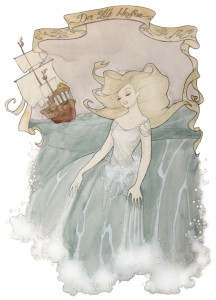The Little Mermaid, Fanfiction and Why I Want a Happy Ending
***SPOILER ALERT***This post contains Divergent Trilogy spoilers*** Fans of Disney's “The Little Mermaid” would be horrified to know the truth behind its happy ending. Hans Christian Andersen, the story’s original author, intended his little mermaid to watch her prince marry another woman, a day before her own tragic demise. In the end, the little mermaid sacrificed her own life for the happiness of the prince she loved.I confess, if I had to pick between these two endings, Disney wins. After all, hadn't she already been through enough having to lose her voice to the witch?As every reader knows, characters are at the mercy of the writers that create them. But that was until the advent of fanfiction - stories that adapt characters, plot or settings from other original work. It is mostly written by fans of popular fiction and then shared online for free.
 For centuries, readers had to accept the fate authors envisioned for their characters. There was no alternate ending to Romeo and Juliet until the eighteenth century when a man named Nahum Tate rewrote the ending to keep the couple alive. With this “new-modeling,” as it was known then, Tate inadvertently became one of the first fanfiction writers seeking his a happy ending to an ill-fated story. The Irish poet also adapted the ending for King Lear so that Cordelia married Edgar and Lear survived.Tate proved that our obsession to give a story a happy ending is not new. The difference is fanfiction gives modern readers a readily available outlet for their discontent. For example, last October Veronica Roth's third installment to her “Divergent” trilogy was released to much anticipation. But readers’ feelings turned to disappointment when they discovered the tragic ending that awaited their beloved heroine. Like the little mermaid, she too was a sacrificial lamb. Blogs, community boards and review sites were inundated with posts from miserable fans clamoring for an alternate ending."I would give one of my arms right now to have an alternate ending," wrote one teen girl.
For centuries, readers had to accept the fate authors envisioned for their characters. There was no alternate ending to Romeo and Juliet until the eighteenth century when a man named Nahum Tate rewrote the ending to keep the couple alive. With this “new-modeling,” as it was known then, Tate inadvertently became one of the first fanfiction writers seeking his a happy ending to an ill-fated story. The Irish poet also adapted the ending for King Lear so that Cordelia married Edgar and Lear survived.Tate proved that our obsession to give a story a happy ending is not new. The difference is fanfiction gives modern readers a readily available outlet for their discontent. For example, last October Veronica Roth's third installment to her “Divergent” trilogy was released to much anticipation. But readers’ feelings turned to disappointment when they discovered the tragic ending that awaited their beloved heroine. Like the little mermaid, she too was a sacrificial lamb. Blogs, community boards and review sites were inundated with posts from miserable fans clamoring for an alternate ending."I would give one of my arms right now to have an alternate ending," wrote one teen girl.  Roth addressed her readers' comments less than a week after the release saying she was happy with the ending she had crafted.Some of her fans turned to fanfiction instead. "I just thought the ending wasn't right," wrote one fanfiction author after posting her own version of the book's last chapters on the Fanfiction.Net site. Her version of the story concluded with a happy ending.But why are we so obsessed with happy endings?The book “Wired for Story” by Lisa Cron, offers some insight. Cron quotes a psychological study which reveals the same sections of the brain that process the senses in our daily life activate when we are engrossed in a story we enjoy. The reader is literally living the story. Additionally when readers are engaged their dopamine neurons fire. If this is true, one could conclude that happy endings contribute to a release of dopamine, resulting in feelings of satisfaction. For me the desire for a happy ending is tied to my journalism day job. Every day I watch a world full of sad endings, of loss and despair, where many characters are doomed to a tragic fate.Books offer an escape. An alternate reality with magical worlds where anything is possible. And where, I can rest assure that the forces of evil will be defeated in the end. With this hope I turn the page to see my favorite heroes and heroines face their darkest hour. I tell them to be strong, both of us must be strong, because the end is in sight and our happy ending awaits.When the respite doesn’t come, and death and destruction awaits instead, our heart breaks. Because we know this story too well. It is not the place we went to escape. It is life.
Roth addressed her readers' comments less than a week after the release saying she was happy with the ending she had crafted.Some of her fans turned to fanfiction instead. "I just thought the ending wasn't right," wrote one fanfiction author after posting her own version of the book's last chapters on the Fanfiction.Net site. Her version of the story concluded with a happy ending.But why are we so obsessed with happy endings?The book “Wired for Story” by Lisa Cron, offers some insight. Cron quotes a psychological study which reveals the same sections of the brain that process the senses in our daily life activate when we are engrossed in a story we enjoy. The reader is literally living the story. Additionally when readers are engaged their dopamine neurons fire. If this is true, one could conclude that happy endings contribute to a release of dopamine, resulting in feelings of satisfaction. For me the desire for a happy ending is tied to my journalism day job. Every day I watch a world full of sad endings, of loss and despair, where many characters are doomed to a tragic fate.Books offer an escape. An alternate reality with magical worlds where anything is possible. And where, I can rest assure that the forces of evil will be defeated in the end. With this hope I turn the page to see my favorite heroes and heroines face their darkest hour. I tell them to be strong, both of us must be strong, because the end is in sight and our happy ending awaits.When the respite doesn’t come, and death and destruction awaits instead, our heart breaks. Because we know this story too well. It is not the place we went to escape. It is life.